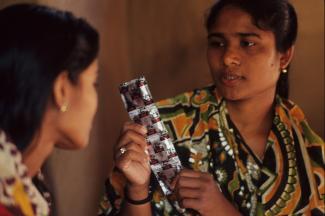Planned parenthood
Indispensable issue

According to the UN’s recently published World Population Prospects, humankind will grow to 9.6 billion people by 2050. Population dynamics are neither about destiny nor sheer statistics, but about human rights, gender equality and personal choices. Unfortunately, not everybody today is in a position to make such choices. To take fate into their own hands, people need information. And they must be able to translate information into action. Empowerment is a key factor.
Comprehensive sex education is of utmost importance, and so is information on sexual and reproductive health and related rights. Obviously, competent awareness raising must then be followed up with unrestricted access to modern contraceptives for everyone. It is a depressing fact that about 220 million women do not have such access today. They are one quarter of all women who need contraceptives in low and middle income contries.
If it is to make sense, any future development agenda needs to take population dynamics into account, both at the individual level and as a crosscutting issue. Everyone deserves access to information and services pertaining to their sexual and reproductive health and their related rights. These issues belong on the post-2015 development agenda, along with the empowerment of women and girls, gender equality and the rights of adolescents and youth.
Reproductive health and sexual self-determination are essential for achieving sustainability in its three dimensions (economic, social and environmental). To have a realistic chance of escaping economic misery, young girls, women and couples who live in poverty must be able to plan how many children they want and when they want them. If they do so, their access to health care and education will improve as will their career opportunities. For a country to reap the benefits of its demographic bonus, these issues must be dealt with in a sensible way.
I was heartened to see this message highlighted at the Women Deliver conference in Kuala Lumpur in late May. Women Deliver is a global advocacy organisation that calls for action to improve the wellbeing of women and girls. Thousands of delegates from all over the world attended to find, share and commit to new ways of empowering young girls and women living in the world’s poorest countries. It was extremely encouraging to hear about progress in countries such as the Philippines or Indonesia, where family-planning services used to be quite restricted. The governments of these two countries have begun to rise to the challenges. This is a sign that real change is possible even in the poorest countries.
A lot has improved over the past 13 years since the Millennium Development Goals (MDGs) were first defined. It is evident, however, that there is a lot of MDG business, which will not be finished by the 2015 conclusion date. Some 80,000 of 284,000 maternal deaths in low- and middle-income countries could easily be prevented annually. For that to happen, all women must get full access to contraceptives and health services. The figure itself proves that investments in sexual and reproductive health are investments in life.
Renate Bähr is the executive director of DSW (Deutsche Stiftung Weltbevölkerung), a non-governmental organisation, and a member of UN’s Task Force for ICDP (International Conference on Population and Development)
info@dsw-hannover.de






